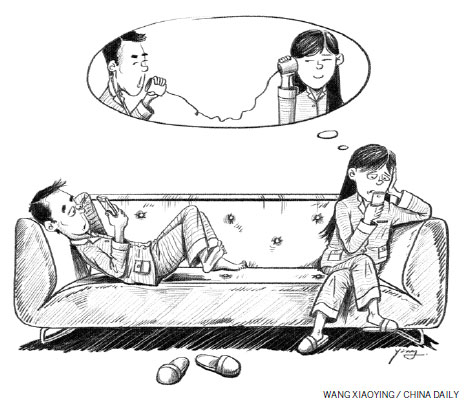
People busy playing with their smartphones at a get-together of family or friends are a common scene nowadays. To make such people realize that ignoring family members or friends is sheer rude behavior, a real-life game has hit the Internet. Those participating in the game, which has become quite popular, cannot play with their mobile phones while having dinner together, and the first one to do so has to foot the dinner bill.
Face-to-face interaction has, to a large extent, given way to online chats thanks to smartphones and virtual social networking applications. Tools for social networking in cyberspace have undergone a generational shift, from QQ and MSN to micro blogs and WeChat, and interpersonal interactions declined over the past decade.
Given the demands of a rapidly advancing society, urban residents have little spare time after work for face-to-face interactions. So they have taken recourse to apps and online chat sites to keep in touch with relatives and friends. As a result, WeChat, as an extension of QQ on mobile phones, has become the top choice of the majority of Chinese for instant messaging.
Compared with face-to-face interaction, people seem to be more comfortable communicating via the Internet. According to Yang Dong, dean of applied psychology at Southwest University in Chongqing, online chat is not only used as a means of killing time, but also a more economical way of maintaining basic contact with relatives and friends. By simply tapping on the screen to give a thumbs-up to or pass a comment on an online posting, one can keep in touch with friends and relatives.
Like any other invention, WeChat and other online social networking tools were created for people's convenience. Yet they have turned many into addicts and left people around them wondering why fewer people today care to meet and talk in person.
People using apps and other communication tools to chat online for long hours could update their friends' circle on their WeChat or weibo homepage, and not knowing the latest developments could make them feel like outcasts. This, to some degree, has weakened their face-to-face interaction skills.